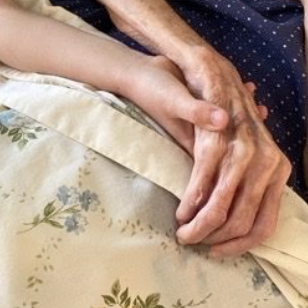Full Circle of Living and Dying: We are advocates for legal rights and death care choices.Keeping or bringing a loved one home after death is legal in every state for bathing, dressing, private viewing, and ceremony as the family chooses. Every state recognizes the next-of-kin’s custody and control of the body that allows the opportunity to hold a home vigil. Religious observations, family gatherings, memorials, and private events are not under the jurisdiction of the State or professionals in the funeral industry, who have no medico-legal authority unless it is transferred to them when they are paid for service.
No one knows better than the dying person and/or family what’s truly necessary or needed when caring for loved ones during end-of-life and after death. When in doubt, call us for additional information, but know that you already have the most important piece of this puzzle: your own best judgment. We at FCLD want you to be empowered by what you can do and have the right to do. Knowing your end-of-life options, choices, and rights allows you to move forward with confidence. (Many thanks to NHFA for this inspiration!) |
Thank you to National Home Funeral Alliance for providing this important information.
It's Legal to take care of our deceased in the home. |
It’s your right. Legally, custody and control rest in the hands of the closest of kin as defined by your state law. Our loved one’s remains are not the property of any commercial or governmental entity. Families have been caring for their own for thousands of years. With this information and support, you and your loved ones can have control over this profound moment in your family’s life and receive enormous personal benefits that come with making these important decisions for yourselves.
|
Final Disposition |
Burial in cemeteries and cremation are the most common practices for final disposition. Depending on where you live and the regulations in your area, other alternatives such as burial at sea, natural green burial, outdoor pyre, alkaline hydrolysis (a water-based chemical process for decomposition), body composting, body donation to medical or forensic facility, promession (human remain disposal by freeze drying), or using cremated remains in various ways may be possible. If choosing to have a cemetery burial or a cremation, knowing whether or not a cemetery or crematorium will accept a body directly from a family should be found out sooner than later. Be sure to inquire about cost and inform crematoriums if deceased has a pacemaker.
Once arrangements for the final disposition are settled, initiate a plan for transportation of the body. In most states, a family can transport the deceased with the necessary permit and a rigid container. Some states require the casket be transported in an enclosed space. Note: Transportation can also be arranged with a mortuary service who will also file documents for the death certificate and permit for transport. For more information: National Home Funeral Alliance - www.homefuneralalliance.org/home-funeral-history.html |

